Best 11 Historical Monuments of Jharkhand
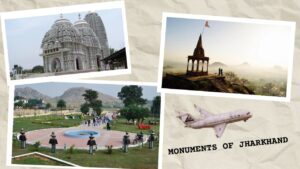
“Have you ever heard about the history of Jharkhand, a state rich in heritage, culture, and monuments? It is known as the land of forests and holds significant historical importance. Embark on a journey through the history of Jharkhand, which provides a fascinating glimpse into ancient times.The region of this state bears witness to many empires and dynasties, such as the Nanda, Maurya, and Gupta, during ancient eras.
Discover the Fascinating history of Jharkhand, filled with chronicles of events and intricately carved marvels and monuments that may leave you astonished.
Take a virtual tour of historical monuments not only in Jharkhand but also in states like Arunachal Pradesh, Tamil Nadu, Andhra Pradesh, and more on our website.”
Time Travel through Jharkhand: Visiting the Historical Monuments of Jharkhand
We are going to explore the many historical monuments of Jharkhand, a state that witnessed the confluence of two different eras, known for sacred places, waterfalls, and hills.
#1. Tagore Hill
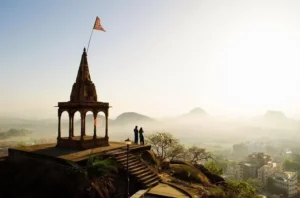
This hill offers the most splendid and majestic views of the sunset and sunrise, located in Morabadi, Ranchi. Previously, it served as the ashram of Rabindranath’s elder brother, Jyotinadra Nath. He constructed a house named Shanti Dham and a monument named Brahma Sthal. Situated at a height of approximately 300 feet, this place now attracts numerous tourists due to its breathtaking views, providing a relaxing escape from the hustle and bustle of the city. Tagore Hill stands out as one of the most popular tourist destinations in the city.
#2. Jagannath Temple, Ranchi:
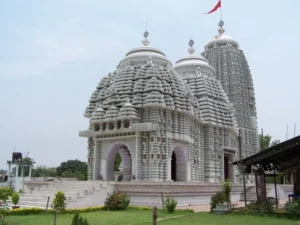
You may have heard of the famous Jagannath Temple in Puri, Orissa, but did you know that there is another Jagannath temple situated in Jharkhand? It was built by Thakur Ani Nath Shahdeo, the king of Barkagarh Jagannathpur, on 25th December 1691. However, this temple resembles the famous Jagannath Temple in Puri, Orissa, but on a smaller scale.
In this temple, the annual Rath Yatra captivates many visitors and tourists. The grand chariot-shaped architecture of this temple is beautifully designed and magnificently carved, making it a major pilgrimage site. The temple was reconstructed in February 1992.
The temple, with its grand chariot-shaped architecture, is a major pilgrimage site and is especially known for its annual Rath Yatra. In 1691, this temple was desecrated and vandalized by the Mughal Emperor Aurangzeb. Later, the temple collapsed on 6 August 1990 and was reconstructed on 8 February 1992.
#3. Nakshatra Van

You may have heard about zodiac signs and their significance in our lives. Well, did you know that every Nakshatra is associated with plants? This place is segregated into different sections based on zodiac signs and nakshatras.
In Hindu Astrology, astrologers believe that each constellation of the zodiac is associated with trees or plants, and those trees have medicinal, aesthetic, or economic value. These plants provide energy to the person born during a particular star.
The best part of this Nakshatra Van is that people can feel connected with eternal nature. The beautiful panoramic view and attractive plants may bring bliss to your heart. This park offers 27 plants corresponding to the 27 Nakshatras planted in the park, reflecting astronomical, social, and medicinal values to the visitors. This park gives an astronomical touch to the visitors.
Nakshatra Van was created by the Jharkhand Forest Department, and the cornerstone of this park was laid by Sri L. K. Advani, Deputy Prime Minister of India, in 2002.
#4. Maluti Temple
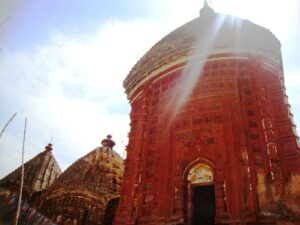
A nondescript hamlet located in Jharkhand’s Dumka district, known as Maluti Village, comprises 108 terracotta Maluti temples. Out of the 108 temples, only 72 still stand, but in a semi-dilapidated condition; the other 36 temples have been lost.
The existence of these temples took place in the 17th and 19th centuries, according to ITRHD (Indian Trust for Rural Heritage and Development), built by the kings of the Baj Basanta dynasty. An interesting story lies in the depth of this village’s discovery. According to many historians and anecdotal evidence, it is believed that in the era of the Muslim ruler Alauddin Husain Shah of Gaura (1495–1525), his entourage visited Maluti village. During this time, the Sultan’s wife lost her pet hawk (baaz) and was very saddened by this happening. The ruler announced that whoever would find the lost pet would be rewarded. A local shepherd named Basanta found the bird and returned it to him. The Sultan rewarded him by giving several acres of tax-free land, and thus, Basanta became the first king of the Baj Basanta Dynasty. Being a religious person, he built many temples. His family was divided into four clans, and they continued to build many temples in their capital. Artisans traveled during this time and met their clans. Under their patronage, these craftsmen built several temples, showcasing different varieties and incredible designs symbolizing various denominations of gods and goddesses.
If you are fond of finding such terracotta temples, you must visit this village in Jharkhand, as it is the 12th endangered Cultural Heritage Site in the world, declared by the GHF (Global Heritage Fund)
#5. Kauleshwari Devi Temple
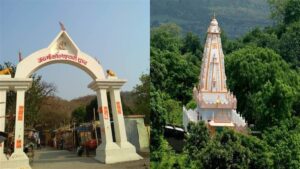
Have you heard the timeless and enduring love story of Devi Sati and Shiva, which never fades and remains eternally captivating in the vast tapestry of the universe?
The story of Devi Sati is heart-wrenching; when she burnt herself in the havan kund, and when Shiva embraced Sati’s body, the whole world was in pain and grief. When Vishnu destroyed Sati’s body with his powerful weapon, Sudarshan Chakra, the entire body of Sati was divided into 52 sections called Shaktipeeth. One of the Shaktipeeths, the womb of Devi Sati, falls in Chatra district, Jharkhand. Consequently, it is known as the Kauleshwari Devi temple, where Kauleshwari Devi, a form of Sati/Kali, is worshipped in this pilgrimage center. However, this place is located at the top of Kolhua Hill, 6 miles (9.7 km) from Hunterganj, now known as Shaligram Ramnarayanpur.
Kolhua Hill is linked with both the ancient Sanskrit epics Ramayana and Mahabharata of India. It is believed that the Pandavas spent some days here during their exile of Agyatvyas, and from the Ramayana, Ram, Sita, and Laxman visited here during their exile period.
#6. Palamu

Well, the most famous park in Jharkhand is Palamu Wildlife Sanctuary and Beta National Park.
This park will give you a wildlife safari feeling and if you are a nature lovers and tourist then you must visit this park as it enthusiasm you with truly surreal surroundings.
The Palamau Wildlife Sanctuary, Betla National Park, River Koel, Palamu Fort, and Lodh Falls are popular tourist destinations in Jharkhand.
#7. Hazaribagh
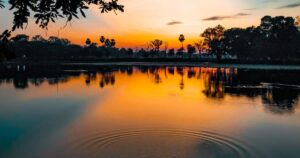
Hazaribagh is a beautiful place that offers a splendid look and natural vibes. If you are fond of wildlife and nature, look no further. This is the best place for relaxing your mood and connecting with nature. You won’t believe that this is the epicenter of Jharkhand tourism, especially for wildlife lovers.
Not only this, but you can explore ancient temples and breathtaking waterfalls as well. Canary Hill, Rajrappa Temple, Hazaribagh National Park, Konar Dam, and Hazaribagh Wildlife Sanctuary are some of the most popular attractions in Hazaribagh.
If you are planning to visit, Hazaribagh has it all for nature enthusiasts and those seeking a peaceful retreat.
#8. Bokaro
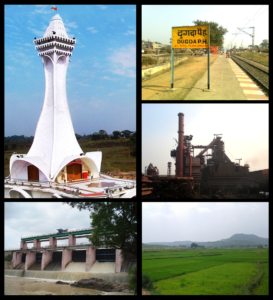
Are you familiar with the well-planned city of Jharkhand, If not, don’t worry we are here to tell you about the majestic and stunning city of Jharkhand.
This city came into existence in 1991, and this city grabbed the attention of many visitors and tourists because of its allurenece and magnificence. This city has many tourist spots where they can wander like Jawaharlal Nehru Biological Park, City Park, Jagannath Temple, and the Gayatri Mandir are very popular for tourism. Well if you do not know that this city is the third most Industrialised area in India. As well as having significant steel and coal industries, Bokaro has several temples, natural sites, and other noteworthy attractions.
If you are planning to visit Jharkhand, you must visit this steel city called Bokaro.
#9. Sahib Ganj
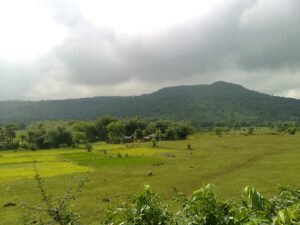
The most attractive destination for sightseeing, trekking, and photography is Sahib Ganj. well, this site is lesser-known but still worth it for tourists and visitors. This place comprises the history of Rajmahal and Teliagarhi Fort. A scenic and panoramic view can leave you stunning state. The most popular attractions in this area are Rajmhal, Moti waterfall, Shivgadi Temple, Bhagwa Kuan, and Mary’s Church.
The history of Sahibganj District in Jharkhand is closely tied to the broader history of the region, including Rajmahal, Teliagarhi Fort, and Sahibganj Town. Originally, it was part of the Santhal Pargana district, created in 1855 after the Santhal Rebellion, which separated from the Bhagalpur and Birbhum Districts.
The area has a long history, with evidence of the Mal Paharia Tribe inhabiting it since ancient times. The Battle of Rajmahal in 1576 played a significant role, marking the beginning of Mughal rule in Bengal. Rajmahal became the capital under Akbar’s general Man Singh but was later shifted to Dacca in 1608. It briefly regained its capital status in 1639 under Shah Shuja, only to lose it again in 1660.
After the Battle of Plassey, the British East India Company captured Bengal, facing opposition from the Paharias in Santhal Pargana. Santhals migrated to the region between 1790 and 1810, facing exploitation from hill-men and traders, leading to the Santhal Rebellion of 1855—an early precursor to the Indian Freedom Movement of 1857.
During the independence movement, Sahibganj played a role in the Salt Satyagraha Movement and the Civil Disobedience Movement of 1930. The British government had to deploy military forces to control the situation.
After independence, the government recognized the socio-economic underdevelopment of Paharias and other tribal groups in the Rajmahal hills. Policies were implemented for their emancipation. The Jharkhand Movement, led by tribal communities, gained momentum, culminating in the creation of the state of Jharkhand on November 15, 2000, comprising 18 districts of the Chota Nagpur Plateau and Santhal Pargana divisions.
#10. Netarhat

Netarhat is a unique hill station situated in the Latehar district, known as the “Queen of Chotanagpur.” This popular destination in Jharkhand is located at an elevation of over 1,100 meters above sea level, offering enchanting beauty and tranquility that captivates visitors at first sight.
Surrounded by picturesque waterfalls, Netarhat is a favorite spot for both locals and tourists, providing a serene escape from the hustle and bustle of the city. Notable attractions include the Netarhat Hills, Koel View Point, Sandi Falls, Magnolia Sunset Point, and Upper Ghaghri Falls, among others. The landscape and view sites make Netarhat a charming destination for those seeking a peaceful retreat.
#11. Rajrappa
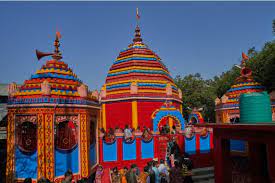
Rajrappa is a waterfall and a beautiful Hindu pilgrimage center in the Ramgarh district of Jharkhand, situated at the confluence of the Damodar and Bhairavi rivers.
The site is renowned for the Chhinnamasta temple, dedicated to the headless deity of the goddess Chhinnamasta, who stands on the body of Kamdev and Devi Rati in a lotus bed. This temple is constructed in Tantrik architectural design and holds significance in mythology.
Rajrappa is also a center for Santals and many other tribals who visit purposefully to immerse the ashes of their loved ones in the Damodar River, seeking salvation and peace for their souls.
Conclusion
Jharkhand is indeed a land of knowledge and rich heritage and culture. If you’re planning to visit this state, consider exploring the historical monuments covered in this article. Additionally, if you’re interested in digitally exploring monuments from different states, our website has extensive coverage of Historical Monuments in Karnataka, Punjab, Arunachal Pradesh, Tamil Nadu, Maharashtra, and more. Visit our website page to delve into the rich cultural heritage and monuments of various states.

This content is very informative and full of detailed information. Really loved it